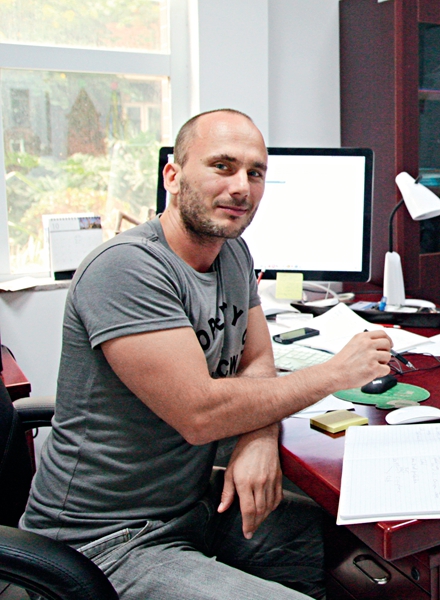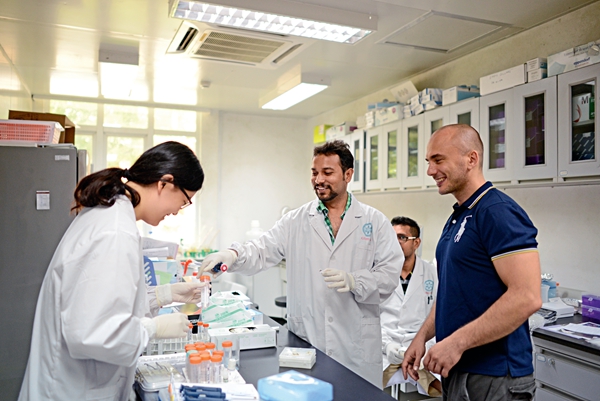By staff reporters HUANG YI & LI YUAN
By staff reporters HUANG YI & LI YUAN
RALF Jauch, a German scientist from Jena, a city in the state of Thuringia, now lives in China as a full-time research fellow with the Chinese Academy of Sciences (CAS) at the Guangzhou Institute of Biomedicine and Health. Jauch’s main research interests lie in genomics, stem cell biology and structural biology. In 2014 he enrolled in the “100 Talents Program” at CAS. Jauch’s connection with China can be traced back to his childhood: his father served as deputy mayor of Jena and was committed to promoting cooperation between Guangzhou and Jena.
Adventure in China
Jauch first came to China in 2012 with his father, as part of an exchange program delegation. They visited Beijing, Guangzhou and Hong Kong. “The visit gave me the chance to learn more about China, a giant country full of vigor,” Jauch said. Despite having lived in Singapore for seven years and having traveled a lot in Southeast Asia, Jauch had not discovered much about China.

German full-time research fellow with the Chinese Academy of Sciences at the Guangzhou Institute of Biomedicine and Health specializing in genomics, stem cell biology, and structural biology.
Jauch found that the area around the Pearl River Delta in China was quite similar to Singapore, particularly in terms of climate, infrastructure, and business environment. Jauch was impressed by the Pearl River Delta’s growing potential for business – an environment with abundant capital and an inclusive culture – so Jauch decided that Guangzhou and Hong Kong would be the best places to look for jobs in the field of scientific research.
In 2013, Jauch finally made the decision to join Guangzhou Institute of Biomedicine and Health (GIBH) after declining offers from Sweden, Canada and South Korea. He formed an international research team of 12 members including doctoral candidates, technicians and post-doctoral researchers, 60 percent of whom had experience of working or studying overseas.
“The decision was prompted by my adventurous nature and desire to learn something new,” Jauch said. He confessed that he came to Guangzhou with the hope of finding a unique way to facilitate his development in the science field.
“The research work at the GIBH is quite familiar to me, and also tallies with my personal interest. There is complete infrastructure and ample funding in place, and the scientists from Western countries among its faculty have already carried out fruitful research work. All these factors combined made me decide to work here,” Jauch said.
Fruitful Results
Jauch got his bachelor’s degree in biology from Friedrich Schiller University, Jena, and his doctorate in molecular and structural biology from the Max Planck Institute. Jauch also has experience in the areas of genomics, stem cell biology, and computational biology.

“Gene banks can help us decode genomes,” Jauch explained, talking about his work. “Life processes like embryonic development, human evolution, and genetic disease are actually manifestations of when and where genes play or stop playing their roles and influence each other. Our goal is to decode these processes. We pay particular attention to key proteins that we term ‘transcription factors’, which can decode these processes. I think if we can better understand these processes we would be able to produce some cells, which then can be used in biopharming.”
Jauch and his team have achieved a lot in the four years since he joined the GIBH. They garnered Larysa Pevny Award for Excellence in SOX Research in 2014. They won financial support for a surface project from the National Natural Science Foundation of China; they received funding for an international cooperation project from the Ministry of Science and Technology; and they got financing for a provincial support project from Guangdong Province – a total of RMB 7 million.
Jauch has published 50 research papers which he has either authored or co-authored, many of which have appeared in world-renowned academic periodicals including Nature, Stem Cell, Nucleic Acid Res and EMBO. His work on multi-potential stem cells’ early differentiation theory has been widely recognized in the academic world.
Jauch is very busy with the responsibilities inherent in leading a research team. Hand in hand with good ideas and exciting projects come certain logistics worries, such as funding, cooperation partners and facility access.
Even with all these attention-demanding issues though, Jauch is dedicated to the personal management of his team. “Jauch has devoted much time to team building. In the weekly meeting of our research team, every member takes turns reporting on their progress. Given that our team members come from different countries including Germany and India, our working language is English, which gives our team an international atmosphere,” one of Jauch’s team members told China Today.
A Bridge for China-Germany Academic Exchanges
According to Jauch, human creativity brings vitality to science, and scientists should be cautious of received opinions and also maximize existing resources and technologies worldwide. “All the countries dominant in the world’s science and technology are testament to this,” Jauch said.
Jauch is devoted to promoting academic exchanges between China and Germany, in particular cooperation and exchanges between Germany’s top academic organization, the Max Planck Society and the GIBH. On several occasions he invited experts from the Max Planck Society to attend seminars in Guangzhou. As a result of Jauch’s hard work, the Max Planck Society and the Guangzhou Institute established a joint research center for regenerative biology and medicine.
Over the past four years, Jauch has invited six German postgraduate students to carry out research work at his laboratory for their graduation thesis projects. He has also helped Chinese students go and study in Germany. “All these exchanges have helped us generate new ideas and have been a lot of fun for participants,” Jauch said.
“Studies on stem cells and genes have not only brought people new concepts and technology, but have had a huge impact on biopharmaceuticals and all of society,” Jauch said. “I hope my team can better understand the gene control process and make progress in lab-growing cells and organs. I hope our research work can help with applications of this field, in line with ethics, for example, producing specific cells via man-made transcription factors in test tubes,” he added.
As a German scientist with his roots firmly in China, Jauch holds that the burgeoning economy of Asia presents plenty of opportunities for German scientists. He believes Germany should attach more importance to their exchanges with Asia, in particular China – this trend of increased exchange with China is developing worldwide and looks to be of great significance.